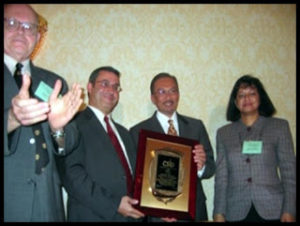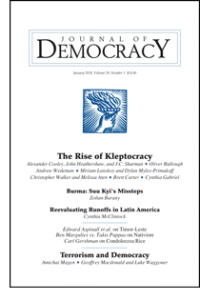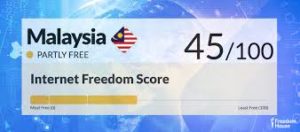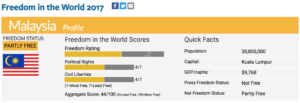The breakout of real democracy in a Muslim-majority Asian country has gone largely unnoticed here in Washington, but we ignore it at our own peril. Malaysia’s fragile democratic experiment is a crucial opportunity for the United States to prove its commitment to its own values and to win a key battle in the strategic competition with China, the Washington Post’s Josh Rogin writes:

Anwar Ibrahim, Malaysia’s prime minister-in-waiting, emerged from more than a decade of wrongful imprisonment last year and joined forces with his jailer Mahathir Mohamad to toss out Najib Razak, whose tenure as Malaysia’s leader broke records for corruption and authoritarian tendencies. Overcoming rigged elections, the Mahathir-Anwar coalition peacefully took control of the government by promoting a platform based on ethnic diversity, reform, accountability and social justice.
Anwar gave his longer pitch for using democracy and capitalism mixed with social justice to push back on the current trend of rising nationalism, extremism and authoritarianism. He warned against authoritarians that use the “trappings of democracy” to lull the free world into complicity, Rogin adds.
“The ambivalence of advanced democracies in light of these clear abuses of power along with the tacit approval of the corporate sector and other international institutions is quite distressing,” Anwar said during a speech hosted by the National Endowment for Democracy. “The survival of autocrats and dictators is largely due to the tacit approval of the West. This is a fact not lost on the people suffering under these regimes.”
Anwar Ibrahim has consistently “defended the universality of the democratic idea and systematically rebutted various doctrines making the case for authoritarianism,” said NED President Carl Gershman. Furthermore, the Malaysian democracy advocate “has always been prepared to pay the price for his beliefs,” he added, citing Anwar’s spells of incarceration.
 These doctrines include what he called “the Asian values mantra” claiming that democracy is a Western idea unsuited to Asian cultures, the view that Islam and democracy are inherently incompatible, and the argument – now promoted by China – that “human rights and freedom are a stumbling block in the eradication of poverty” and that authoritarianism is needed for development, Gershman added.
These doctrines include what he called “the Asian values mantra” claiming that democracy is a Western idea unsuited to Asian cultures, the view that Islam and democracy are inherently incompatible, and the argument – now promoted by China – that “human rights and freedom are a stumbling block in the eradication of poverty” and that authoritarianism is needed for development, Gershman added.
His comments came as Anwar, President of Malaysia’s People’s Justice Party, prepared to deliver the Fifteenth Annual Seymour Martin Lipset Lecture (above) on Democracy in the World at Canadian Embassy in Washington, DC, on the topic of “Confronting Authoritarianism.“
“I’ve always talked about democracy, freedom, liberal ideas, but there is a difference when you taste it: you value these ideals more,” said Anwar. “When it is denied to you, freedom is a torture and also a reason for survival,” he told the Observer.

Credit: CSID
He strongly believes that the people will ultimately decide on Malaysia’s next prime minister despite an earlier agreement that he will be the eighth prime minister after Tun Dr Mahathir Mohamad, the New Straits Times reports:
“Right now, yes! The arrangement is that I become prime minister next, but you are right, ultimately the people will decide,” Anwar told CNN International anchor Richard Quest during the CNN Talk Asia programme, adding that he had no reason to doubt Dr Mahathir’s pledge in honouring the arrangement. When asked why he wanted to work with the man who had once jailed him, Anwar replied that he did not hold any grudges and that the suffering he underwent was minimal compared to the suffering of the nation under the previous government.
 “Why can’t we overlook the negative side, it is not about the past but how we are going to work together to bring a new future for the country,” he said. “The whole administrative system had been compromised, with corruption being endemic and kleptocracy ruining the state.”
“Why can’t we overlook the negative side, it is not about the past but how we are going to work together to bring a new future for the country,” he said. “The whole administrative system had been compromised, with corruption being endemic and kleptocracy ruining the state.”
“Something has to be done. To me, personally, it is satisfying to see that here comes a man to save the country from corruption and kleptocracy,” he said, explaining why there was a need to work with Dr Mahathir.
But rivals within Mr Anwar’s People’s Justice Party (the PKR) — the largest member of the ruling Pakatan Harapan coalition — could yet threaten his path to the leadership, the Financial Times reports. “There are “pockets, people who for their own reasons would like to sabotage these arrangements…… I can’t deny, some people in the ruling coalition [have] a different agenda,” Mr Anwar told the FT in an interview:
Mr Anwar pointed to his return to parliament in a landslide by-election victory as proof of popular support: “[The] public perception is I am going to take over and assume the premiership.” But commentators say an anti-Anwar faction within the PKR is led by Azmin Ali, Malaysia’s economic affairs minister. “Azmin’s people . . . may slow, or add uncertainty to, Anwar’s accession to the premiership in the hope this buys Azmin time to position himself as Mahathir’s successor instead,” wrote Peter Mumford, Asia director at Eurasia Group. The rivalry could escalate if Mr Mahathir reshuffles Malaysia’s cabinet early this year and appoints Mr Azmin to a more powerful ministerial position.
“The majority of us still believes the transition will happen where Anwar will assume the premiership at the end of 2019 or early 2020,” said Wong Chen, a politician in Mr Anwar’s party, but added that many members of parliament were anxious about the political manoeuvring.
 Since taking power the ruling Pakatan Harapan (Coalition of Hope) consortium has proved less than decisive. An inchoate alliance of sectional parties, not a coherent political force with a unified outlook and clear agenda, Pakatan Harapan (PH) is exasperating many of its most devoted supporters, notes Clive Kessler, emeritus professor of sociology and anthropology at the University of New South Wales in Sydney.
Since taking power the ruling Pakatan Harapan (Coalition of Hope) consortium has proved less than decisive. An inchoate alliance of sectional parties, not a coherent political force with a unified outlook and clear agenda, Pakatan Harapan (PH) is exasperating many of its most devoted supporters, notes Clive Kessler, emeritus professor of sociology and anthropology at the University of New South Wales in Sydney.
The longer-term implications of this tendency are toward the polarization of Malaysian society and politics, he writes for the Nikkei Review:
In prospect is a brutal contest between the fragmented forces of social democratic pluralism, now awkwardly huddling together within PH, and the religiously driven Malay ethno-sectarians, now in an alliance where the remains of the old UMNO are increasingly being made the willing and even desperate instrument of PAS with its agenda of making Malaysia an explicitly Islamic state operating under shari’ah law.
 The PH government arose from “bottom-up mobilization,” on a steadily growing wave of civil society activism, not coherent opposition party strength; its adversaries led by PAS and a variety of Islamist NGOs and political pressure groups are now seeking to bring down the government by recourse to far more ominous and intimidatory forms of the same strategy. They seek to show that PH cannot govern, and that they can deny it the opportunity and the authority to do so.
The PH government arose from “bottom-up mobilization,” on a steadily growing wave of civil society activism, not coherent opposition party strength; its adversaries led by PAS and a variety of Islamist NGOs and political pressure groups are now seeking to bring down the government by recourse to far more ominous and intimidatory forms of the same strategy. They seek to show that PH cannot govern, and that they can deny it the opportunity and the authority to do so.
“Now there is a new dawn for Malaysia. I must thank the people of Malaysia. Malays, Chinese, Indians, Kadazans, Iban – the entire spectrum of our Malaysians, regardless of race and religion who stood by the principles of democracy and freedom,” Anwar told supporters the night of his release from prison.







